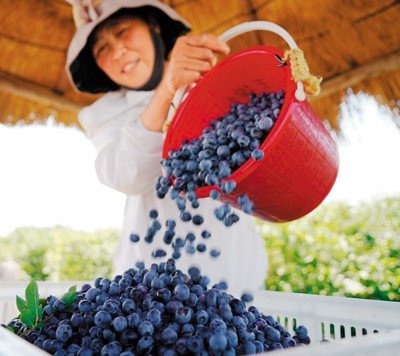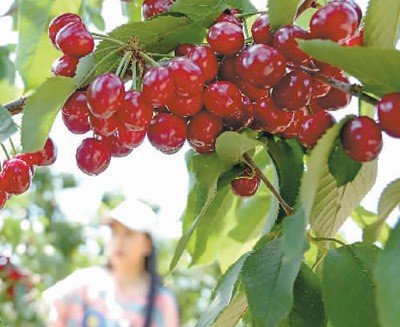Homegrown Fruits Add Sweetness to Chinese People's Lives
Thanks to the domestic fruit industry's pursuit of high quality and large-scale and standardized cultivation, Chinese people are now being offered more and cheaper options of many types of fruits, including cherries, blueberries, and kiwi fruit, which used to be mostly imported from other countries.
Expanding Market Presence
"Previously expensive blueberries have become increasingly affordable," a citizen surnamed Li, who is in charge of buying food for his family of five, told People's Daily Overseas Edition.
The price of blueberries has come down to 7.9 yuan ($1.09) per box (125 grams) in some shopping malls and supermarkets in China, Li said, adding that most of the products come from southwest China's Yunnan Province and are just as good as imported blueberries in terms of taste, size, and freshness.
Besides blueberries, many other types of lesser-known fruits that were often imported from other countries, such as red grapes, mandarin oranges, cherries, kiwi fruit, mangoes, lychees, and dragon fruits, have also been successfully cultivated in many regions of China. This means longer supply periods and cheaper prices for Chinese consumers.
With the industrialization of blueberry cultivation, the blueberry season can last from March to October in China, with the average price of the fruit being much lower than that of imported blueberries sold during November and February.
 |
| Photo shows a farmer harvesting blueberries at a blueberry orchard in Sucun Township, Yinan County, east China's Shandong Province, June 9, 2023. [Xinhua/Yin Jun] |
As China's fruit industry's number of new varieties blooms and becomes higher in quality, domestic fruits are becoming an increasingly common sight at fruit markets across the country.
"One of our large retailers told us that about 10 years ago, 90 percent of the fruits they sold were imported, while the proportion of domestic fruits today has exceeded 30 percent and is increasing," said Liu Chengxin, general manager of Hainan Xiyuan Ecological Agriculture Co., Ltd. The company, based in south China's Hainan Province, specializes in the cultivation and sale of tropical and subtropical fruits. It has supplied many new types of high-quality homegrown fruits and vegetables to the domestic market in recent years.
"In fact, brand building and large-scale development was proposed and practiced in the domestic fruit industry seven or eight years ago. Since it takes time for an agricultural endeavor to yield fruits, consumers didn't enjoy the results of these efforts until recent years," Zhai Shujia, an executive of the agricultural technology and product incubation center of Alibaba's online community group buying platform, Taibao Maicai.
More Types of Lesser-Known Fruits
China's total fruit planting area grew to more than 12.8 million hectares in 2021, with the area of traditional fruits like apples and pears decreasing while that of lesser-known fruits, including cherries, kiwi fruit, and strawberries, continuing to rise, according to a report on the development of China's fruit industry in 2022 published by China Fruit Marketing Association.
Recently, the news that the first batch of homegrown durians are about to ripen in Hainan has heartened Chinese consumers eager to enjoy domestic durians for the first time.
 |
| Photo taken on June 6, 2023 shows a tourist picking cherries at an orchard in Duzhuang Township, Haigang District, Qinhuangdao City, north China's Hebei Province. [Xinhua/Yang Shiyao] |
Hainan Xiyuan Ecological Agriculture Co.,. Ltd. has planted 1,300 mu (about 86.67 hectares) of Musang King durian in its plantation. The durian trees, which have begun to bear fruit, are expected to provide fresh Musang King durians for the Chinese market for the first time, as all Musang King durian imports from abroad have been frozen fruit so far.
Data released by the International Blueberry Organization (IBO) showed that the global planting area of blueberries reached 235,400 hectares in 2021, and China, with a total blueberry planting area of nearly 70,000 hectares, has surpassed the U.S., Chile, and Peru to become the world's largest producer of blueberries.
While blueberry is not a traditional fruit in China, it is now grown on a large scale in more than 20 provincial-level regions in China, thanks to surging consumer demand in the country.
Upgraded Post-Harvest Treatment and Transportation
China is the largest producer of kiwi fruit in the world, according to the report on the development of China's fruit industry in 2022, which noted that China made up more than 50 percent of the global kiwi fruit supply in 2020. However, China is also the largest importer of kiwi fruit, according to the report.
Due to the country's lack of advanced post-harvest preservation technology and means of transporting fresh fruit, China has been unable to ensure a sufficient supply of ready-to-eat kiwi fruit for the domestic market. As a result, it imports a large quantity of high-quality kiwi fruit from foreign countries every year.
"About three or four years ago, we noticed that imported ready-to-eat kiwi fruit sold very well in China, and there was no domestic fruit that could compete with it," said Zhai, who revealed that Alibaba's subsidiary that specializes in digital agriculture has been working together with outstanding kiwi fruit production areas to cultivate and promote homegrown ready-to-eat kiwi fruit over the past years.
Their endeavor has paid off well. Zhai's team has made great achievements in the development of ripening technology for kiwi fruit and finally managed to make sure their ready-to-eat kiwi fruit provided for consumers are at the peak tasting period when they have just the right amount of firmness and sweetness.
Shaanxi Lyuyilong Agriculture and Forestry Development Co., Ltd., a company based in Wugong County, northwest China's Shaanxi Province, operates 1,800 mu of kiwi fruit orchards. All the kiwi fruit produced by these orchards are ready for consumption as they enter the terminal market, which has been the largest change seen in the orchards in the recent couple of years.
"Ready-to-eat kiwi fruit guarantees a good consumer experience. Their supply still falls short of demand. We don't need to worry about sales as long as our quality is good," said Liu Xiaofeng, an executive of the company.
Many industry insiders believe that China's massive consumer market's demand for the stable quality, continuous supply, and reasonable price of fruit is constantly driving the country's fruit industry toward large-scale and standardized development. They are convinced that homegrown fruit are bound to play a greater role in the world's largest fruit producing and consuming market.
(Source: People's Daily Online)
Please understand that womenofchina.cn,a non-profit, information-communication website, cannot reach every writer before using articles and images. For copyright issues, please contact us by emailing: website@womenofchina.cn. The articles published and opinions expressed on this website represent the opinions of writers and are not necessarily shared by womenofchina.cn.








.jpg)

 WeChat
WeChat Weibo
Weibo 京公网安备 11010102004314号
京公网安备 11010102004314号